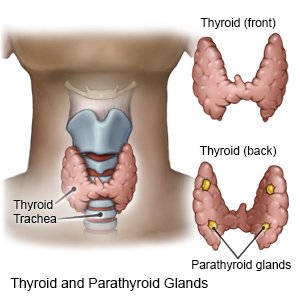Acquired Hypothyroidism in Children
Medically reviewed by Drugs.com. Last updated on Apr 2, 2024.
Acquired hypothyroidism is a condition that develops when your child's thyroid gland makes little or no thyroid hormone. Thyroid hormones help control body temperature, heart rate, growth, and gaining or losing weight. Thyroid hormones play an important role in the normal growth and development of children. Acquired hypothyroidism usually affects children starting at 6 months of age. Some children who have hypothyroidism when they are born show signs and symptoms much later in childhood.
 |
WHILE YOU ARE HERE:
Informed consent
is a legal document that explains the tests, treatments, or procedures that your child may need. Informed consent means you understand what will be done and can make decisions about what you want. You give your permission when you sign the consent form. You can have someone sign this form for you if you are not able to sign it. You have the right to understand your child's medical care in words you know. Before you sign the consent form, understand the risks and benefits of what will be done to your child. Make sure all of your questions are answered.
Rest:
Let your child rest when needed. Ask your child's healthcare provider when your child may return to normal activity.
Stay with your child for comfort and support
as often as possible while he or she is in the hospital. Ask another family member or someone close to the family to stay with your child when you cannot be there. Bring items from home that will comfort your child, such as a favorite blanket or toy.
An EKG
test records your child's heart rhythm and how fast his or her heart beats. Sticky pads placed on your child's skin record the electrical activity of his or her heart.
Intake and output:
- Your child's healthcare provider may need to know how much liquid your child is getting and urinating. Healthcare providers may also want to know how much your child eats and if he or she had a bowel movement.
- You may need to save your child's diapers so a healthcare provider can weigh them. A urine bag may be used to collect and measure the amount of urine, or your child may need to urinate into a container in bed. Do not throw away diapers or the urine bag, or flush urine down the toilet before asking your child's healthcare provider.
Medicines:
Your child may need one or more of the following medicines:
- Thyroid hormone may be given to bring his or her thyroid hormone level back to normal.
- Heart medicine may be given to make your child's heart beat stronger or more regularly. There are many different kinds of heart medicines. Talk with healthcare providers to find out what your child's medicine is and why he or she is taking it.
Treatment options
The following list of medications are related to or used in the treatment of this condition.
Tests:
Your child may need any of the following tests:
- Blood tests may be done to see how well your child's thyroid gland is working. These tests may tell his or her healthcare provider how low the levels of thyroid hormones are in his or her blood. They may also be used to see how well his or her thyroid is responding to the treatments.
- Thyroid scan shows healthcare providers how your child's thyroid is working. Radioactive dye may be put into your child's IV line or given to him or her to drink. The working part of the thyroid gland absorbs (soaks up) the dye. Two to 48 hours later, healthcare providers put a machine called a gamma camera over his or her neck. The machine takes pictures showing the areas of his or her thyroid that absorbed the dye.
- Thyroid ultrasound is used to see the inside of your child's thyroid gland. Sound waves are used to show pictures of his or her thyroid gland and tissues on a TV-like screen.
RISKS:
Without treatment, your child may have learning problems, poor growth, or delayed development. Your child may also develop myxedema, which is a dangerous condition. Myxedema may cause swelling in your child's legs, ankles, lungs, or around his or her heart. He or she may have seizures, or go into a deep coma and die if he or she does not get medical care quickly.
CARE AGREEMENT:
You have the right to help plan your child's care. Learn about your child's health condition and how it may be treated. Discuss treatment options with your child's healthcare providers to decide what care you want for your child.© Copyright Merative 2024 Information is for End User's use only and may not be sold, redistributed or otherwise used for commercial purposes.
The above information is an educational aid only. It is not intended as medical advice for individual conditions or treatments. Talk to your doctor, nurse or pharmacist before following any medical regimen to see if it is safe and effective for you.
Learn more about Acquired Hypothyroidism
Treatment options
Care guides
- Acquired Hypothyroidism in Children
- Hypothyroidism
- Induced Thyroid Disorders
- Subclinical Hypothyroidism
Symptoms and treatments
Medicine.com guides (external)
Further information
Always consult your healthcare provider to ensure the information displayed on this page applies to your personal circumstances.
